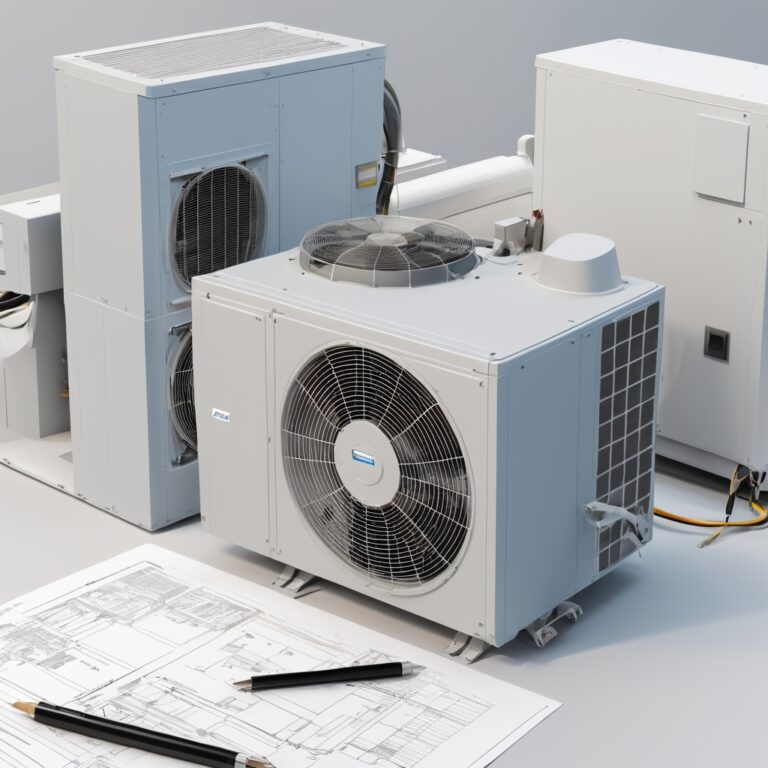If your home or building feels unevenly heated or cooled, your energy bills keep climbing, or you simply wonder how efficiently your HVAC system is running, an HVAC energy audit could be the answer. For property owners and facility managers, scheduling this type of audit is one of the smartest ways to cut energy waste, boost comfort, and extend equipment life.
An HVAC energy audit gives you a detailed look at how your system consumes energy, highlights air leaks or insulation issues, and uncovers problems that might otherwise go unnoticed.
This guide explains what happens during your first HVAC energy audit, the checklist items professionals use, and why working with experts like Energy Design Systems (EDS) ensures reliable results that go beyond a standard DIY inspection.
What Is an HVAC Energy Audit?
An HVAC energy audit is a comprehensive evaluation of your heating, cooling, and ventilation systems. The goal is to pinpoint energy loss, inefficiencies, or design flaws that impact performance and drive up utility costs.
Unlike a quick maintenance check, a professional energy audit uses advanced tools and techniques to analyze everything from ductwork and insulation to controls and airflow. The result is a clear action plan that helps you lower energy use without sacrificing comfort.
Why an HVAC Energy Audit Matters
Even if your HVAC system seems to be running fine, hidden inefficiencies may be costing you more than you realize. A professional audit helps you:
- Detect air leaks, duct losses, and missing insulation
- Identify overworked or undersized system components
- Improve thermostat programming and zoning
- Reduce monthly energy bills
- Extend system lifespan with proactive maintenance
For both homeowners and building managers, an audit delivers savings opportunities that simple maintenance alone cannot uncover.
Step-by-Step: What Happens During an HVAC Energy Audit
Here’s what you can expect when you schedule a professional audit:
1. Initial Consultation
Your auditor gathers background information about your building, including:
- Utility bills (12–24 months)
- Past HVAC service history
- Comfort concerns (hot/cold spots, weak airflow)
This helps tailor the audit to your specific needs.
2. System Inspection
Technicians perform a hands-on evaluation of equipment, including:
- Furnace & air handler: filter condition, burner efficiency
- Air conditioner/heat pump: refrigerant levels, compressor function
- Ductwork: leaks, disconnections, blockages
- Thermostats: placement and programming
They also verify if your system is properly sized—an oversized or undersized unit can waste significant energy.
3. Air Leakage & Insulation Tests
One of the most revealing steps includes:
- Blower door tests to measure air infiltration
- Thermal imaging cameras to locate missing insulation
- Duct pressure tests to find leaks
- Smoke tools to track airflow patterns
These tests determine whether your building’s envelope is helping or hindering efficiency.
4. System Performance Analysis
Real-time monitoring tools measure:
- Airflow at supply and return vents
- Temperature differences across system components
- Static pressure within ducts
This helps identify bottlenecks or underperforming areas.
5. Controls & Automation Review
Smart controls and zoning systems are evaluated to ensure they’re programmed correctly. Auditors look at:
- Thermostat scheduling and efficiency
- Zone balance and comfort distribution
- Peak vs. off-peak usage patterns
Optimizing controls can save energy without compromising comfort.
6. Indoor Air Quality Assessment
Comfort isn’t just about temperature—it’s also about air quality. Auditors often check:
- Exhaust fans in kitchens and bathrooms
- Fresh air intake and ventilation balance
- Humidity levels and possible allergen buildup
Proper ventilation helps avoid comfort and health issues while still conserving energy.
7. Final Audit Report
You’ll receive a detailed written report outlining:
- Current HVAC system condition
- Utility usage patterns
- Photos and diagnostic data
- Energy-saving recommendations with cost/ROI breakdown
- Upgrade or replacement options
This report becomes your roadmap for improvements.
HVAC Energy Audit Checklist
A thorough audit typically covers:
- System age and efficiency rating
- Ductwork leaks and airflow readings
- Air leakage test results
- Insulation quality
- Thermostat settings and smart controls
- Ventilation system inspection
- Energy consumption analysis
- Cost-saving opportunities
Professional vs. DIY Energy Audits
While homeowners can spot drafts or adjust thermostats, professional audits go far deeper.
| DIY Audit | Professional Audit |
| Simple visual checks | Advanced testing with blower doors & thermal imaging |
| Limited by owner’s knowledge | Backed by HVAC engineering expertise |
| No performance monitoring | Data-driven, real-time analysis |
| General tips | Action plan with ROI-based solutions |
If you want accurate, measurable results, a professional audit is essential.
After the Audit: Your Next Steps
Depending on findings, you may choose:
- Quick fixes like air sealing or thermostat reprogramming
- Mid-level upgrades such as duct sealing or added insulation
- Major improvements like replacing outdated equipment or installing zoning systems
Most homeowners and businesses recover their investment within a few years through energy savings and better comfort.
How Often Should You Get an HVAC Energy Audit?
- Homes: every 3–5 years, or after major renovations
- Businesses: annually, due to heavier system usage and complexity
- Any property: immediately if bills spike, comfort decreases, or your system is 10+ years old
Conclusion
An HVAC energy audit is more than a maintenance check—it’s a proactive strategy to lower energy costs, enhance indoor comfort, and extend system life.
At Energy Design Systems (EDS), we combine years of HVAC expertise with AI-powered load calculations and advanced software to deliver the most accurate energy audits available. Our team doesn’t just point out inefficiencies—we help you solve them with proven, cost-effective strategies.
Ready to see how your HVAC system is really performing? Contact EDS today for a customized energy audit and discover hidden savings while creating a more comfortable, efficient space.
